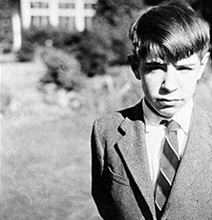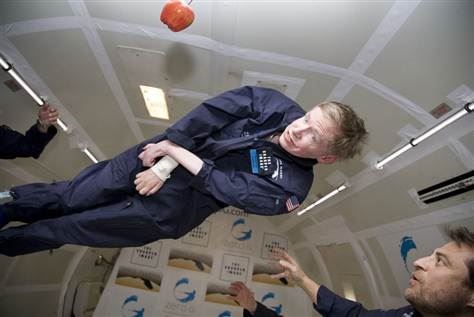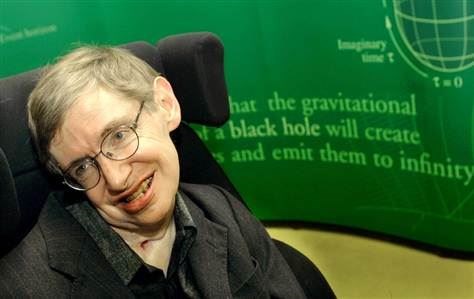 |
| Stpeh Hawking as a Child (http://www.bitrebels.com/wp-content/uploads/2011/10/Stephen-Hawking-As-Child-Main.jpg ()) |
Black
holes. A region of space having a gravitational field so intense
that no matter or radiation can escape. Each person may imagine them
in his or her own way, and they may mean something different to each
person. Some do not care about them at all, others find them interesting, while
still others are fascinated by them. For Stephen Hawking, black holes are his
life. Born on January 8, 1942 (300 years after the birth of Isaac
Newton and the death of Galileo) in Oxford, England to
Frank and E.I Hawking, Hawking was exposed to science at a young age.
His father, a research biologist wanted his son to follow in his footsteps, but
by the age of fourteen Hawking knew he wanted to study physics and mathematics.
He went to college at Oxford University, and later earned his PhD in
physics from Cambridge university. It was around this time he noticed that his
motor skills, such as writing and holding
objects or even walking straight, had deteriorated. Worried, he
went to see a specialist, who gave him the shattering news: he had
amyotrophic lateral sclerosis, also known as Lou Gehrig's disease. This disease
slowly eats away at your dexterity, leaving you in a state of complete or nearly complete
paralysis, which may result in death. It is as though your brain is left in an
empty shell that you have no control over. Like any normal person, Hawking
shrank into the depths of despair. This disease had become the black hole in
his life, sucking up all of his joy. He became depressed, and lost
interest in his work. But then, suddenly, his outlook on life changed. He
decided that, instead of seeing his disease as a black hole, he would see it as
a bright star of opportunity. He started his work again with renewed
vigor, and looked for anything this disease may have given him:
" In an essay published in Science Digest,
Hawking claimed that rather than hampering his progress, his disabilities had
actually "helped me in a way by shielding me from
lecturing and administrative work" (Stephen W.
Hawking." Newsmakers. Detroit). This new outlook on life was
the starting line for the rest of his life. Throughout his life, Stephen
Hawking's courage, innovation, and perseverance have made
him a hero not just only to those with physical
disabilities, but to all people because he shows us that we can always achieve
our dreams if we put our minds to it.
Like many of the
world renowned scientists of today, Stephen Hawking got to where he is today because
he had the courage to do what many thought was hopeless. For many years, the
origin of the universe has been disputed. A clash exists between
scientists and religion. Because scientists had no absolute proof for
their theories, they could never settle this dispute: "Hawking wanted to
develop a Grand Unified Theory, an effort to further explain the beginnings of
space and time. Such a magnificent goal involved merging quantum
mechanics with Einstein's theory of relativity, to produce a full quantum
theory of gravity" (Stephen Hawking. "Astronomy & Space: From
the Big Bang to the Big Crunch"). Hawking displays courage as he strives
to merge two theories that have stood apart from each other since their
creations. Till today, no scientist has come close to combining these two
universally accepted theories. They have remained apart like the two poles of a
magnet, never meeting. But, Hawking has set out to unify these two ends. He
believes that the merging of these two concepts is not only possible,
but also will result in a huge scientific breakthrough, that may bring
scientists closer to discovering the origin of the universe. Hawking is determined
to put an end to this age long dispute. Many view Hawking's will to not be
dissuaded by other's thoughts and actions as commendable. He is frequently
compared to others such as Galileo and Einstein, who like him, did
not succumb to the negative opinions of others: "That prowess
has made him the modern successor to such giants of science as Galileo,
Newton, and Einstein, and it has also made him--along with
his refusal to be cowed by the circumstances of his disease--a symbol of human
courage and tenacity."" (Stephen W. Hawking." Newsmakers).
Those who want to make a change in the world must not be afraid of others'
ridicule and criticism. They must continue with their heads held high
and must have courage and confidence. Even though these people lived in
times where their findings could cause themselves more harm than success if
they were to announce them publicly, they did not waver. This has made those like
Hawking symbols to all the other scientists of what they can achieve if they
have the "courage and tenacity" that Hawking possesses.
 |
| Stephen Hawking in Zero Gravity (http://msnbcmedia4.msn.com/j/msnbc/Components/Photos/070426/070426_StevenHawkinsZeroG_hmed_6p.grid-6x2.jpg ()) |
A major part of
Hawking's character is his creativity; he is capable of discovering
new ways to do things that others only dream of doing. Because of his
disabilities, he is not able to perform many tasks necessary to execute scientific
experiments. Instead, he has discovered other ways to do them that do not
involve as much physical labor. ""Stephen's genius," says
Harvard astronomist William Press in the New York Times Magazine,
"is in piercing through to the solution without having to calculate
nonessential pieces."" (Stephen W. Hawking." Newsmakers.
Detroit). His disability has, in a way, aided him. He thinks
more and does less, so he can focus on the typically troublesome
theoretical parts, and can discover new and wonderful
things just by using his mind instead of getting caught up in lab and field
work. He is able to come up with his theories in his own way by merely putting
the pieces together as if they were a puzzle. We can compare his methods to
those used by other revolutionary scientists who were labeled eccentric during
their respective time periods: "In 1973, he applied Einstein's
general theory of relativity to the principles of quantum
mechanics. And he showed that black holes were not completely black
but could leak radiation and eventually explode and disappear,
a finding that is still reverberating through physics and cosmology."
(Life and the Cosmos, word by painstaking word." New York Times). This is a major finding for the
scientific community for two reasons. Firstly, it was new. It was something
that had never been discovered before, and possibly had
not even occurred to anyone other than Hawking and his
colleagues. Secondly, it was amazing because of the way he discovered it. It
was previously mentioned that the Theory of Relativity and the Theory
of Quantum Physics have never be merged before. This is partly because there
had never been anything that such a merged theory applied to.
Not only did Hawking discover something that affected the scientific
community in monumental ways, his method itself was unheard of. What Hawking
can achieve through his slightly unique methods is also amazing. His plans: "...involved
merging quantum mechanics with Einstein's theory of relativity, to produce a
full quantum theory of gravity. This theory, if it could be worked out, would
be as significant as Newton's laws of motion." (Stephen
Hawking."Astronomy &Space: From the Big Bang to the Big Crunch).
Once again, we must bring up the merging of the two theories. It is true, that
a theory made by merging these two together would possibly be as major as
either of the two original theories, if not more, and can indeed be compared to
Newton's own theories. A quantum theory of gravity is something scientists have only ever
dreamed of creating. If Hawking manages this, his name would be listed with
Newton and Galileo as one of the greatest scientists to have lived.
Though his methods may seem a little different from other scientists, they allow
him to discover great things while overcoming his own weaknesses.
 |
| Stephen Hawking in Zero Gravity (http://msnbcmedia4.msn.com/j/msnbc/Components/Photos/070426/070426_StevenHawkinsZeroG_hmed_6p.grid-6x2.jpg ()) |
When many people picture
Stephen Hawking, they see a man in a wheelchair, crippled and unable to perform
even the most fundamental functions. But despite this physique, he kept persevering
and never gave up, even in the face of extreme difficulty. Many writers, journalists,
and TV show hosts have asked Hawking about how his condition has hampered his
life, and every time his answer has been the same: "In an essay published
in Science Digest, Hawking claimed that rather than hampering his
progress, his disabilities had actually "helped me in a way by shielding
me from lecturing and administrative work." Confined to a wheelchair, his
physical powers reduced to the use of three fingers, his speech unintelligible
to most listeners, Hawking embarked on what would prove a brilliant
career." (Stephen W. Hawking." Newsmakers. Detroit).
Instead of complaining or becoming depressed and lazy because of his handicaps,
Hawking has only used them as a reason to work even harder than before. Instead
of cowering in a little corner and depending on others take care of him, he
lives a full life, and continues to work diligently. He remains optimistic, and
utilizes the few good things that have resulted from his experiences to push
him forward and keep him going. Even if it is not much, he is still able to aim
for the small glimmer at the end of his dark tunnel. Unlike most people,
Hawking also does not allow his handicap to keep him from doing most everything
he would have done were he "fully functioning": "In April, he went on a
90-minute Zero Gravity Corp. flight and experienced weightlessness eight
separate times as the modified Boeing 727 flew to 24,000 feet then made a
series of dives at a 45 degree angle... "It was amazing. I could have gone
on and on. Space, here I come." He hoped to go to space before the end of
his life. In 2010 Into the Universe with Stephen Hawking debuted on
television" (Stephen W. Hawking." Newsmakers. Detroit).
Now, most people who cannot move their bodies would normally stay confined to
their beds or, at least, to their neighborhoods. Hawking not only left his
neighborhood, he aimed to leave the entire planet! He understands that though
his disabilities can take away his dexterity, they cannot rid him of his
dreams, and he still aims to fulfill them. And not only does he continue to
live his life, he lives it to the fullest! He is also not afraid to rejoin the
world, or to let the world see him. Many people with disabilities might be too
ashamed of their bodies to appear in public, but Hawking has permanently etched
into his mind the resolution to live his life normally, and that is what he
continues to do. He lives his life, and allows his family to live their lives
without having to sacrifice too much for him. He allows them to experience
things that he would probably do with them more often were he able to.
Hawking even has the morale to attend interviews. Even though speaking is a
difficult task for him, he manages to attend while enjoying himself and
entertaining others: "On a screen attached to his wheelchair,
commonly used words flash past him. With a cheek muscle, he signals an
electronic sensor in his eyeglasses to transmit instructions to the computer.
In this way he slowly builds sentences; the computer transforms them into
the metallic, otherworldly voice familiar to Dr. Hawking's legion of
fans...It's an exhausting and time-consuming process. Yet this is how
he stays connected to the world... Yet despite the limitations, it was Dr.
Hawking who wanted to do the interview in person rather than by
e-mail."("Life and the Cosmos, word by painstaking
word." New York Times). He finds his own ways to overcome his
handicaps. As stated previously in the same article, he has the questions for
the interview sent to him in advance so he can have answers typed in
beforehand, and won't have to type each answer at the interview. Life for
someone with his handicaps must be troublesome enough as it is, but he still
finds the time and the energy to do these kinds of tasks. He never lets the glumness
of his situating discourage him, and he never looks at the grim and dark side
of things. He always remains optimistic, and focuses on what he can do at that
moment, instead of what he will not be able to do. Instead of lingering in the
dark, Hawking always moves toward that small gleam of light in the distance.
Even if he slips and falls, or loses sight of the light for a second, he is not
deterred. He continues toward the light and lives his life as fully as
possible.
 |
| Stephen Hawking presenting his findings (http://msnbcmedia2.msn.com/j/msnbc/Components/Photos/040716/040716_hawking_blkhole_hmed11a.grid-6x2.jpg ()) |
No matter if it is work or his
personal life, Stephen Hawking has never allowed himself to become trapped by
the black holes of his life, and his qualities have made him a star
of hope to all those faced with the black holes of disabilities. Like all the
other great scientists of the past, Hawking has had to overcome many
difficulties, but he has had the courage to look past lack of support from others, and has never backed down, no matter how large the task may
seem. He has never let the obstacles in his life slow him down, finding his own
unique ways to get around the hurdles: "Although
his body had become very frail and he had to use a wheelchair, his mind
remained as sharp as ever. Hawking learned to write using a specialized
computer attached to his wheelchair and to speak through a machine called a
speech synthesizer"("Stephen
Hawking."Astronomy & Space: From the Big Bang to the Big Crunch.). To me, personally, Stephen Hawking has been a great inspiration. For
those like me, who get frustrated and give up easily, he is a true role model. He has never backed down, no matter how bad the
situation may seem. He shows us that the fear of failure should never stop us from
trying. He teaches us that we should never let the black holes in our life
suck out all of our light. We have to fight back, and keep going,
even if it may seem like we may not win the battle. Because, at some
point, even black holes must die, and a new star is born.
Works
Cited
Dreifus, Claudia. "Life and the Cosmos, word by painstaking word." New York Times10 May 2011: D1(L). Gale Biography In Context. Web. 27 Mar. 2012.
"Stephen Hawking."Astronomy &Space: From the Big Bang to the Big Crunch.Gale,2008. Gale Biography In
Context.Web. 26 Mar. 2012.
"Stephen W. Hawking." Newsmakers. Detroit: Gale, 1990. Gale Biography In Context. Web. 21 Mar. 2012.
Page created on 4/22/2012 12:00:00 AM
Last edited 4/22/2012 12:00:00 AM
